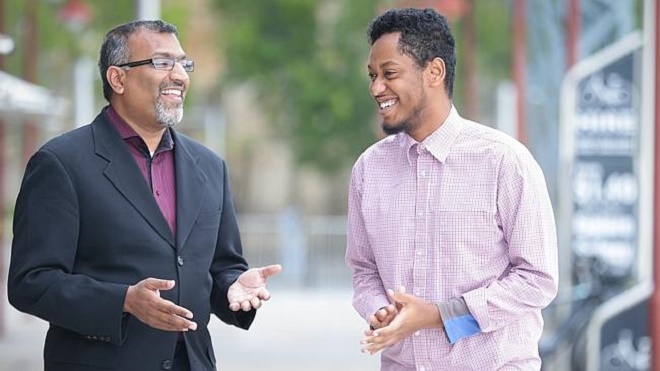
‘Every community wants to have ownership of their own narrative’: Shahed Amanullah, left, and Abdullahi Alim yesterday. Picture: Renee Nowytarger Source: News Corp Australia.

Nicola Berkovic
Friday, June 12, 2015
advertisements
Solutions to counter violent extremism need to come from within the Muslim community and especially from young Muslims, who need to take ownership of their own stories.Abdullahi Alim, whose parents are from Somalia, also believes young Muslims need to be able to connect with mentors — or “extreme heroes” — who can encourage them down constructive rather than destructive paths.
“It doesn’t mean an imam or a sheik, it could be an accountant at Deloittes or someone who works in operations at the Australian Red Cross,” Mr Alim said.
The 22-year-old, who teaches finance and statistics at the University of Western Australia, travelled from Perth to Sydney this week to be part of Hackabout, a three-day challenge to develop apps or ideas to tackle extremism, involving about 60 young people.
Mr Alim said parents from war-torn countries such as Iraq sometimes did not recognise the challenges faced by their children because what they had survived was so much worse.
“I think that can lead young people into a vacuum,” he said. “We need mentors to show people that there are others in the community who are willing to invest in them.”
A Tinder-style app for Muslims was one of the ideas seized on by the Hackabout group — not to help young people find a date, but rather to match them with members of the community willing to be their mentors.
Mr Alim said solutions to tackling violent extremism needed to come from within the Muslim community, and young people in particular needed to be involved in those strategies.
“I think every community wants to have ownership of their own narrative,” he said.
“I don’t think this is an issue specifically for government or community leaders or academics to address … It can’t be an up-to-down approach.”
Affinis Labs’ Shahed Amanullah, who was one of the event organisers, said the aim was to develop initiatives to engage young Muslims.
“When you look at people who are running off or letting extremism get to them, a big part of that vulnerability comes from not feeling comfortable in their own skin,” he said. “(Islamic State) is coming into that void and saying, ‘we have a path that elevates you and makes you important’. It appeals to young people not because of the ideology but because it speaks to their worth.”
Mr Amanullah, a Muslim American who previously worked for the US State Department, said the ideas developed by the group were not overt in the way they tackled extremism.
“We’re trying to create something that speaks to them as young Muslims, that helps them realise they have a worth that doesn’t require them to go off and do something stupid,” he said.
Those solutions would help to counter online propaganda tools used by Islamic State to target those who felt disenfranchised.